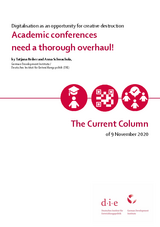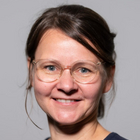The Current Column
Digitalisation as an opportunity for creative destruction
Academic conferences need a thorough overhaul!
Reiber, Tatjana / Anna SchwachulaThe Current Column (2020)
German Development Institute / Deutsches Institut für Entwicklungspolitik (DIE), The Current Column of 9 November 2020
Since the COVID pandemic struck, more and more academic events have moved online. The coronavirus is forcing us to break new virtual ground. Given the climate crisis and the significant carbon footprint that face-to-face conferences generate, this should remain the case in the future too. However, we also need to use the digital transformation as an opportunity for a radical reform of how we do conferences. After all, they were hardly good role models even before the pandemic: lone speakers in endless monologues, death by PowerPoint and panel discussions dominated by know-alls do not become any more attractive when they are put online. They also undermine the actual objective of academic get-togethers, which is to exchange knowledge, generate new ideas and forge networks. When conferences fail to serve these purposes, they become a waste of time, whether the academic events in question are being held in a physical or virtual space.
So how can academic conferences and meetings embrace digitalisation so as to build back better? We need to overcome the unique challenges of the digital arena while also making the various formats stimulating, appropriate and inclusive. Implicit norms that enable communication to flow smoothly in the real world have to be explicitly explained in its digital counterpart: who speaks when? How can you get people to notice you? Speakers do not get any verbal or non-verbal feedback when people’s video and audio are switched off, making it hard for them to gauge whether their input is interesting or their audience shares their point of view, for example. Digital formats also bring the temptation to check in only briefly while doing something else on the side: in the digital world, people feel less committed. To combat digital fatigue, we need short blocks, regular breaks, stimulating exercises such as energisers and more opportunities for participants to get involved. A good event needs a set of clear aims, for which a suitable format should be developed. What is important – networking, sharing knowledge or finding new solutions together? For Networking, participants need to come together in an atmosphere of mutual respect. Making new contacts over coffee does not happen by itself and is something of a challenge, particularly for introverts. It's better to create opportunities for discussions on specific themes. The range of possibilities is extensive: speed dating based on a set list of questions, a digital noticeboard pinned with “I’m looking for...” and “I offer...” adverts, or themed tables for people to sit around and chat. People also often find it easier to make new contacts when they are doing the same thing, such as solving a problem together.
If the objective is to exchange knowledge, for example on research findings, panel debates – where a parade of papers are presented in a monotone – are not suited to the task. Instead, how about lightning talks, where speakers have three to five minutes to pitch the results of their research? Anyone interested in finding out more after the time is up can then go along to a more detailed discussion. By offering a prize for the most vivid presentation (or the best poster), you can also give people an incentive to showcase their ideas in an innovative way.
Organisers looking to provide a forum for developing (research) projects should expressly invite attendees to share their ideas at an early stage, allowing them to lay the foundations for an inspiring exchange of knowledge and opinions. This could involve feedback rules or specific questions for the audience (which elements did you find particularly helpful, where do you see the most potential, what did you not find particularly convincing?). If the aim is to find solutions to specific problems, workshops with a practical bent or interactive formats such as World Cafés are a good option.
A lack of diversity and privileged groups dominating proceedings do not only pose a problem for the people who do not get to speak – insufficient inclusion reinforces existing asymmetries of knowledge and power. For academic disciplines focused on sustainability, which rely on a diverse range of normative and conceptual points of view, this is something of a loss.
But what will encourage young people, women, people from the Global South, or introverts – any of those groups currently underrepresented in discussions – to make an active contribution? Making space for reflection before discussions helps people get their thoughts in order. This prevents the floor from being seized immediately by those who, maybe because of their seniority, can come up with a comment especially quickly. According to a study, it matters who gets to speak first: if it is a woman, the group involved in the subsequent discussion will be much more diverse. The digital space offers opportunities here too. Digital tools such as chats, apps for pooling questions and digital noticeboards make it easier for people who do not enjoy expressing themselves verbally to contribute their ideas. If you want to strike out in a completely new direction, a BarCamp, where participants convene meetings spontaneously, would be a suitable format – not least as a way to flatten hierarchies.
Academic conferences need a thorough overhaul. If we want to make attractive formats for exchanging ideas, we need to leave our well-trodden paths and get creative. The surge in digitalisation brought on by the coronavirus might even be an opportunity in this regard, as it is creating space for innovation. Let’s seize the moment to revolutionise conferences!



